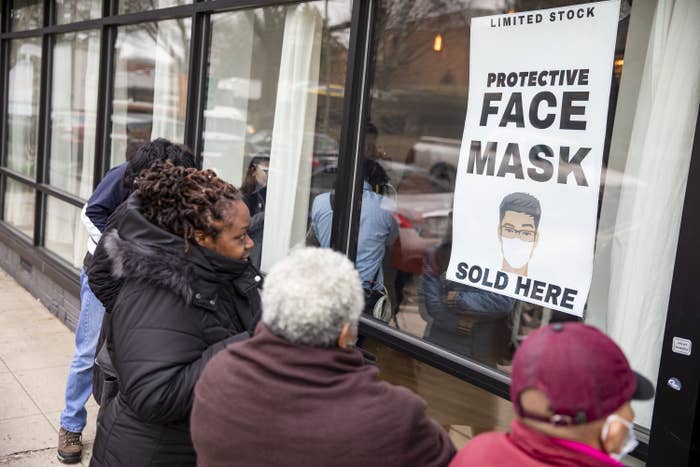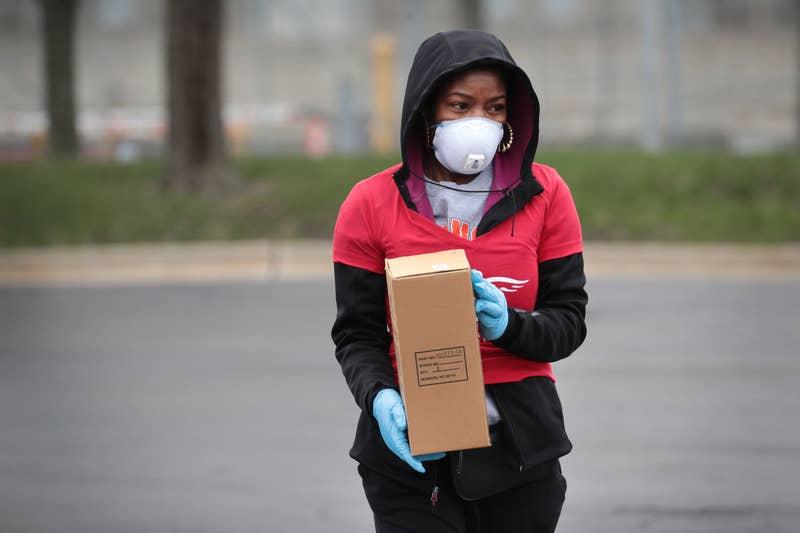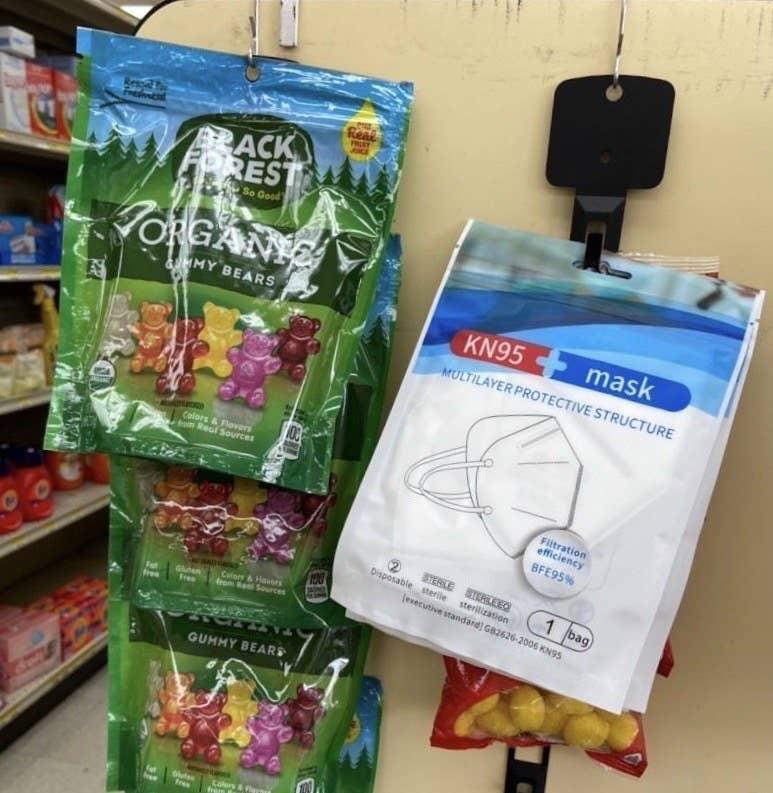Coronavirus Cases Have Surged, But The US Is Refusing To Take The World’s Most Available Masks
The KN95 mask is a Chinese alternative to the scarce N95 mask, but the FDA refuses to allow it into the country. Ken BensingerBuzzFeed News Reporter March 29, 2020
Ken BensingerBuzzFeed News Reporter March 29, 2020
Samuel Corum / Getty Images
As hospitals around the country desperately seek N95 respirator masks to protect health care workers treating COVID-19 patients, the federal government has blocked imports of what might be the world’s most abundant alternative.
That mask is designed to filter out at least 95% of particles that are 0.3 microns or larger in size — the same measure used for the scarce N95 mask. Like the N95, it fits closely around the nose and mouth, creating a seal that decreases the risk of infection. And the Centers for Disease Control has said it’s as effective as N95, which is certified under US testing standards. But this second type of mask, called the KN95, complies with slightly different norms and is made in factories that have not been certified by the US government.
By law, masks, along with most medical devices, can’t be imported or sold in the United States without the Food and Drug Administration’s say-so. Last week, to ease the national shortfall of protective gear, the FDA issued an emergency authorization for non-N95 respirators that had been certified by five foreign countries as well as the European Union. It conspicuously left the KN95 masks out of the emergency authorization.
The omission was all the more startling because in late February the Centers for Disease Control and Prevention said that KN95 masks were one of numerous “suitable alternatives” to N95 masks “when supplies are short.”
The FDA did not respond to multiple requests for comment.
A significant majority of all respirator masks, including both the N95 and KN95, are manufactured in China. During the height of that country’s outbreak, China restricted exports of virtually all respirator masks, keeping them for domestic use. As that country’s infection numbers have slowed it has eased those restrictions, but now the US must compete with dozens of other countries desperate to acquire masks.
Allowing the importation and use of KN95 could help to greatly alleviate the scarcity.
“The KN95 masks are far more readily available,” said Bob Tilton, who owns a New Jersey–based cosmetics packaging importer and earlier this month decided to use his familiarity with Chinese supply chains to bring in masks and other personal protective equipment to sell to hospitals. “The N95s are much harder to grab.”
Yet without the FDA’s seal of approval, importers are hesitant to order KN95 masks because they worry they’ll get held up at customs. Many hospitals are refusing to accept them, even as free donations, because they fear legal liability should a health care worker get ill while using a nonpermitted device.
Under ordinary circumstances, N95 masks — which are certified by the National Institute for Occupational Safety and Health — are abundant, available at hardware stores and pharmacies for around $1 apiece and for as little as 35 cents apiece wholesale. But in just two months, the coronavirus pandemic has depleted the world’s supply, creating a gray market that has driven prices for a single mask as high as $12 or more. That, in turn, has opened the door to unscrupulous actors running internet scams that take payment for N95 masks they never deliver, and to others selling counterfeit or mislabeled N95 masks, which could put health care workers at serious risk of infection.
Meanwhile, masks made under the newly permitted US standards — Australia, Brazil, Japan, Korea, Mexico, and the EU — are not made in as great quantities as the N95 or KN95, according to industry experts.
According to 3M, the world’s largest mask manufacturer, the KN95 is “equivalent” and “can be expected to function very similar” to the N95 mask. That opinion was echoed on Feb. 29 by the CDC, which said the KN95 is one of seven foreign-certified respirators “expected to provide protection to workers.”

hakima@hakima70477643
kn95 masks1.05$ available WeChat:15807086825 WhatsApp:+00861841337093207:45 AM - 24 Mar 2020
Tilton is one of a growing number of entrepreneurs and do-gooders who have rushed to find ways to bring respirators into the country to meet the urgent national need. The federal government recently estimated that the US would require 3.5 billion masks over the next year to address COVID-19.
Earlier this month Tilton applied for and received a medical device importer’s license from the FDA and soon thereafter inked a deal to sell 111,000 masks to a large hospital group in New Jersey. Because of the scarcity and high cost of the N95 masks, he split the order between those and KN95 masks and worries that some may get held up.
“You don’t want to risk $500,000 or $1 million on a shipment of masks in hopes the customs people look away,” said Tilton. “I’m not going to take any more orders until I know we can get everything through.”
A spokesperson for Customs and Border Patrol, which oversees all imports, said that the agency had recently intercepted various COVID-19-related products coming into the country because they were either counterfeit or not permitted, but could not elaborate on whether any were KN95 masks. An advisory paper published by law firm Covington and Burling last week predicted “increased screening, examination, and sampling at ports” of medical devices.

Scott Olson / Getty Images
Some believe that the FDA’s omission may be motivated by rising tensions between the US and China during the outbreak. Earlier this month, President Donald Trump made a point of referring to the pathogen as the “Chinese virus,” while last week Secretary of State Mike Pompeo’s insistence on calling it the “Wuhan virus” led to the spiking of a G7 joint communiqué on the pandemic.
“It seems like this is happening for political reasons,” said Byron Walker, who owns SurivalFrog.com, an online store that focuses on survival gear. After noticing a month ago that his own small inventory of N95 masks had sold out overnight, he decided to try to import many more. He reached out to the Colorado Department of Human Services and agreed to sell it 50,000 masks at cost, and plans to donate an additional 10,000 masks to hospitals in Denver, where he lives.
After considerable effort, Walker was able to source the masks at a cost of more than $3 and is awaiting the first shipments early this week. But he says he could have ordered at least twice as many KN95 masks if they were permitted.
Vernessa Pollard, an attorney at McDermott Will & Emery whose practice focuses on FDA law and who formerly worked at the agency, dismisses such concerns. She said she was aware of several health care providers that had been inquiring about authorization from the FDA to import KN95 masks, and understood that the agency was reviewing scientific data to determine that the respirators were truly equivalent.
“My belief is the FDA is looking at the KN95 to be allowed to be imported,” Pollard said. “It’s science-based. I don’t believe there is anything political at all.”
In the meantime, however, prices for the US-approved N95 masks continue to surge. One survey of offers from China on Friday showed KN95 masks averaged significantly less than half the price — roughly $1.44 compared to $3.60 apiece.
Although some hospitals flat-out reject KN95 masks at any price on advice of their lawyers, people rounding up masks to give to hospitals have found that individual doctors or nurses will often accept the donations, given the dire need. On March 17, the CDC issued guidance saying that health care personnel could use bandanas, scarves, or other “homemade masks” as “a last resort.”
Despite the import restrictions, some KN95 masks are trickling through. The FDA has set up several special email addresses for inquiries about shortages, and several importers said that prior to the EUA issued last week, they had received guidance from agency officials that small shipments of KN95 would likely not be stopped at the border.

Courtesy of Jon Passantino
KN95 masks for sale for $8.99 at a market in Santa Monica, California, March 28.
Some of those masks are already working their way into the consumer marketplace. Although N95 masks have been sold out for at least a month, KN95s have begun appearing in retail stores.
The Farms, a neighborhood market in Santa Monica, California, had masks labeled “KN95” for sale at $8.99 for a two-pack, or close to $5 apiece with tax, on Saturday evening. According to an employee who answered the phone, they were sold out by the next morning. “We should have more tomorrow,” the employee said.
Karen Conway, an executive at GHX, which provides technological solutions to supply chain management for the health care industry, said that given the extreme shortages, “the most important thing is to get health care workers what they need.”

Ken Bensinger is an investigative reporter for BuzzFeed News and is based in Los Angeles. He is the author of "Red Card," on the FIFA scandal. His DMs are open.

No comments:
Post a Comment